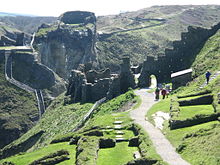Tintagel (Arnold Bax)
Tintagel is a symphonic poem by the composer Arnold Bax . It is his best-known work, and for a time the only one through which the composer was known to concert-goers. The piece was inspired by the visit to Tintagel Castle in Cornwall , which Bax visited in 1917 and makes reference, although not explicitly programmatically, to the history and mythology that surrounds the castle.
History of origin
During the late summer of 1917 - with the pianist Harriet Cohen , with whom he had a passionate love affair - Bax spent six weeks in Cornwall. They visited Tintagel Castle , which inspired the composer to write a symphonic poem. The piece was fully sketched out during October 1917 and orchestrated from that time until January 1919. It's dedicated to Cohen.
In a program note, written in 1922, Bax stated “that the piece is only program music in the broadest sense”. It aimed, he said, to give an impression of the cliffs, the Tintagel Castle and the lake “on a sunny but not windless day” and to reflect the literary and traditional associations with this scenery.
Tintagel premiered on October 20, 1921 in Bournemouth with the Bournemouth Municipal Orchestra under Dan Godfrey . The Musical Times reported:
“On October 20, the main focus was [...] on the first performance of a new composition by Arnold Bax, titled Tintagel . It was performed very successfully, and Mr. Bax received a sincere burst of applause. The abundant beautiful passages in his score and the poetic quality of the music are illustrated everywhere. Meanwhile, one noted that a better structural balance could have been achieved and a keener sense of the climax would have improved the heartfelt handwriting. Mr. Godfrey's handling of the complicated score was beyond reproach. "
To the music
From Bax's published analysis:
“After a few introductory bars, the music opens with a theme proclaimed by the brass that can be seen as a representation of the castle ruins. [...] The theme is expanded to a wide climax and is followed by a long melody of the strings that may suggest the serene and almost endless expanse of the sea. After a while a rather restless mood begins to assert itself, as if the sea was rising. "
At this point, Bax writes, he sought the instillation of tension to conjure up the dramatic legends of King Arthur and King Mark (brand of Cornwall). "You hear a plaintive chromatic figure who gradually dominates the music". Here Bax quotes a theme from Richard Wagner's Tristan und Isolde (a work set near the Cornish coast). This is followed by what Bax calls "a sudden descending climax", followed by a passage intended to give the impression of "immense waves slowly gaining strength until they crash against the inviolable rocks". The theme of the sea is repeated and the work ends with the recurrence of the opening theme "The castle, still defying the sun and the wind of the centuries."
The performance lasts approximately 12–15 minutes.
Significant recordings
When Bax's music became neglected more than a decade after his death in 1953, Tintagel was the only one of his works that got a permanent place in the repertoire. By 2014 the piece had been recorded 15 times. The earliest recording was made for His Master's Voice in 1928, with the New York Symphony Orchestra under Eugène Aynsley Goossens ; it was the only one during the composer's lifetime and the shortest recorded performance at 12 minutes and 10 seconds. The Penguin Guide to Recorded Classical Music names that of the LSO under John Barbirolli , first published in 1967, as the authoritative reference recording ; this recording lasts 15 minutes.
literature
- Webber, Christopher: TINTAGEL on Record, A Survey (2007)
- Lewis Foreman: Bax: A Composer and his Times . Scolar Press, London and Berkeley 1983, ISBN 978-0-85967-643-4 .
- Ivan March, Edward Greenfield; Robert Layton; Paul Czajkowski: The Penguin Guide to Recorded Classical Music 2009. Penguin, London 2008, ISBN 978-0-141-03335-8 .
Individual evidence
- ^ A b c d Lewis Foreman: Bax: A Composer and his Times. Ed .: Scolar Press. London and Berkeley 1983, ISBN 978-0-85967-643-4 (page 150)
- ^ The Musical Times , December 1921: "Music in the Provinces - Bournemouth", p. 865
- ↑ Foreman, Lewis. "Bax, Sir Arnold" , Grove Music Online, Oxford University Press, accessed October 7, 2015
- ^ Parlett, Graham. "Discography" , The Sir Arnold Bax Website, last accessed August 7, 2017
- ↑ Notes on the reissue of Dutton CD CDBP 9779, OCLC 172986239
- ↑ March et al., P. 80
- ↑ Notes on EMI CD 0094637998359, OCLC 858233401
